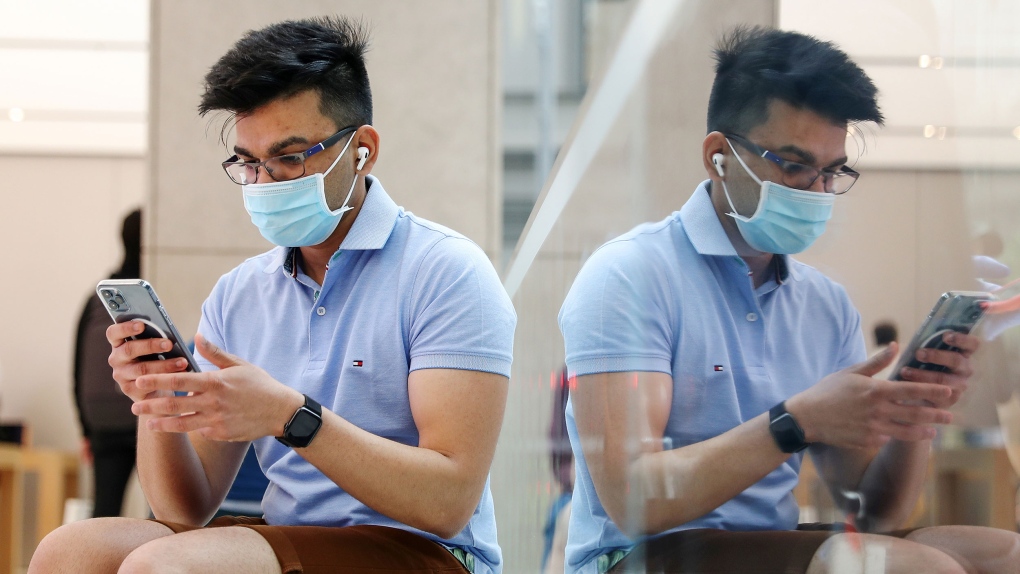Misinformation on social media linked to higher spread of COVID-19 in new study
 A customer wearing a protective mask tries out an iPhone 12 Pro Max at the Apple flagship store. (Brendon Thome/Bloomberg/Getty Images/CNN)
A customer wearing a protective mask tries out an iPhone 12 Pro Max at the Apple flagship store. (Brendon Thome/Bloomberg/Getty Images/CNN)
A new study found social media use was linked to a higher spread of COVID-19 in the early stages of the pandemic, which researchers suggest could be due to widespread misinformation.
“What we found was surprising,” says research lead Jude Kong, an assistant professor at York University’s faculty of science. “This highlights the need to consider the dynamic role that social media plays in epidemics.”
After examining social media use across 58 countries, researchers at York University and the University of British Columbia discovered a potential correlation between social media use at the start of the pandemic and the spread of COVID-19.
Their findings suggest that the more false information spread, such as messages downplaying the potential dangers of COVID-19 or the effectiveness of mask-wearing and social distancing, the more the case count increased.
The study cited Canada as an example, saying the country had a lower level of social media use than the United States, and a lower number of COVID-19 cases at the beginning of the pandemic.
In the initial stage of COVID-19, information was sparse on the disease, the study said, and vaccines were not yet developed.
“So it appears that false information filled an important void for people in countries where social media and reality were tightly weaved,” the study reads.
However, the study ends on an optimistic note. Now, more than a year since the pandemic began, a wealth of scientific research and experience has been accumulated. The report indicates that social media could actually help slow a contagion’s spread by promoting factual information that combats misinformation.
Kong says by examining the influence social media has had throughout the pandemic, “It will help us to actually come up with efficient intervention measures going forward.”
CTVNews.ca Top Stories

'It's a giant mess': Confusion remains about the GST/HST holiday
The organization representing small and medium size businesses in Canada says the start to the GST and HST holiday has been 'a giant mess.'
Donald Trump says Canada becoming 51st U.S. state is 'a great idea.' Jean Charest calls the comment a 'wake-up call'
U.S. President-elect Donald Trump is taking aim at Canada once more, saying it would be 'a great idea' to make it America's ‘51st state.'
'You're either with Beijing or you're with Washington': Ford says to Mexico in CNN interview
Ontario Premier Doug Ford has a message for Mexico as the threat of tariffs by incoming president Donald Trump hangs over both sides of the U.S. border.
There are 88 new Order of Canada appointees. Here's a look at some of the most notable names
Ryan Reynolds, Scott Oake and Maureen Ann Jennings are among the 88 new recipients of the Order of Canada.
NEW Here's how the cost of living challenges are shaking up Canadian seniors' retirement plans
With the high cost of living increasingly a concern, some seniors are making sacrifices to help their adult children and grandchildren make ends meet. Here are some of their stories.
Sikh separatist group accuses Russia of involvement in killing of B.C. activist
A Sikh separatist group is accusing the Russian government of direct involvement in the murder of activist Hardeep Singh Nijjar outside his gurdwara last year in Surrey, B.C.
'Why would I box myself in?: Singh on why he won't commit to helping bring Trudeau's gov't down, yet
NDP Leader Jagmeet Singh says U.S. president-elect Donald Trump's looming tariff threat is part of the reason why he's not committing to voting non-confidence in Prime Minister Justin Trudeau's government.
Iconic Halifax ship Theodore Too partially sunk at Ontario dock
An iconic ship that was a fixture in Halifax Harbour for 21 years has partially sunk in Ontario.
Oscars shortlist revealed. See which movies made the cut
A shortlist of Oscar contenders in ten categories has been revealed.
































